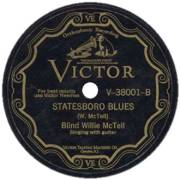Statesboro Blues
| "Statesboro Blues" | ||||
|---|---|---|---|---|
 |
||||
| Single by Blind Willie McTell | ||||
| A-side | "Three Women Blues" | |||
| Released | 1928 | |||
| Format | 10-inch 78-rpm record | |||
| Recorded | Atlanta, Georgia, October 17, 1928 | |||
| Genre | Piedmont blues | |||
| Length | 2:30 | |||
| Label | Victor V-38001 | |||
| Writer(s) | Blind Willie McTell | |||
| Blind Willie McTell singles chronology | ||||
|
||||
"Statesboro Blues" is a Piedmont blues song written by Blind Willie McTell, who recorded it in 1928. The title refers to the town of Statesboro, Georgia. Taj Mahal recorded a popular blues-rock adaptation of the song in 1968. His version inspired a recording by the Allman Brothers Band, which is ranked number nine on Rolling Stone magazine's list of the "100 Greatest Guitar Songs of All Time". In 2005, the Atlanta Journal-Constitution ranked "Statesboro Blues" number 57 on its list of "100 Songs of the South".
Although McTell was born in Thomson, Georgia, in an interview he called Statesboro "my real home." He made the first recording of the song for Victor, on October 17, 1928 (Victor #38001). The eight sides he recorded for Victor, including "Statesboro Blues", have been described as "superb examples of storytelling in music, coupled with dazzling guitar work."
The lyrics, a first-person narrative, appear to relate the story of a man pleading with a woman to let him in her house; the speaker calls himself "Papa McTell" in the first stanza ("Have you got the nerve to drive Papa McTell from your door?"). Throughout the song, the woman, addressed as "mama," is alternately pleaded with (to go with the speaker "up the country") and threatened ("When I leave this time, pretty mama, I'm going away to stay"). Throughout the non-linear narrative, the "Statesboro blues" are invoked—an unexplained condition from which the speaker and his entire family seem to be suffering ("I woke up this morning / Had them Statesboro blues / I looked over in the corner: grandma and grandpa had 'em too"). Later versions, such as the one by the Allman Brothers Band, have shorter, simplified lyrics.
As with many blues lyrics, it can be difficult to establish rules for the narrative order of the stanzas. In the case of "Statesboro Blues," Richard Blaustein attempted a structural analysis of McTell's song in an approach influenced by Claude Lévi-Strauss; it is unclear whether his results are applicable to other blues songs.
...
Wikipedia
